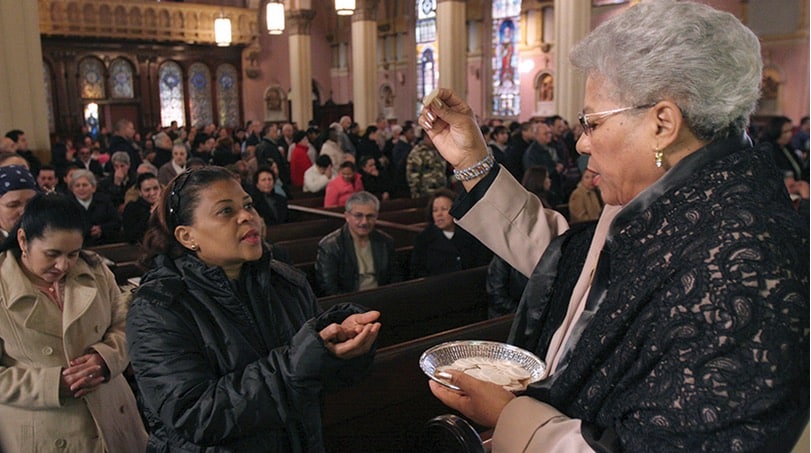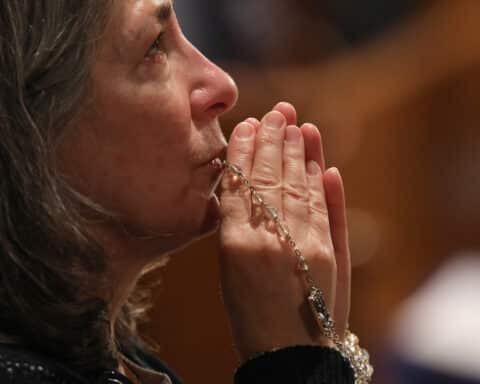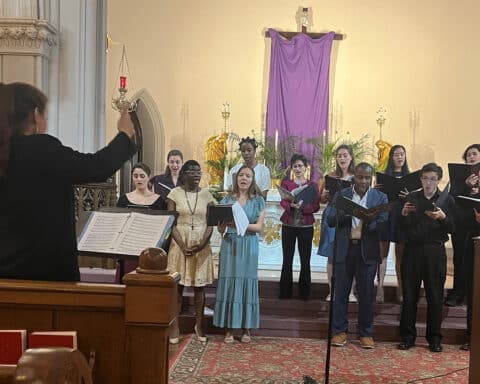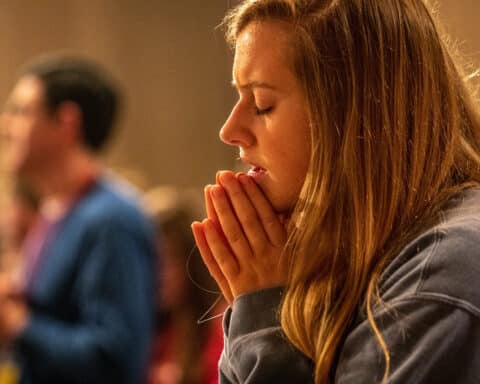
— K.J.F., Los Angeles, California
Answer: It would be proper and required. If one discerns that they cannot receive holy Communion due to unconfessed mortal sin or ongoing dissent from Church teaching, they are still obliged to attend Mass. Hence, they should still go, because we are obliged to go to Mass every Sunday, though we are not obliged to receive holy Communion every Sunday. The metaphor of going to a restaurant but not eating isn’t really a good example. One goes to a restaurant with the main purpose of eating. However, one goes to Mass foremost to worship God and pay a debt of gratitude and worship, which we owe in justice.
At Mass, God also teaches us his word and bestows many other blessings, especially that of holy Communion. However, for some, their union with the Lord may have been broken due to serious sin, or the fact that they dissent from the Lord’s teaching in Scripture or from doctrinal teachings to be definitely held by the faithful. While they still have the obligation to attend Mass, receiving holy Communion when such a union has been severed is to celebrate that which is untrue. The full meaning of the “Amen” pronounced by those who receive holy Communion is: “I believe and profess all that the holy Catholic Church believes, teaches and professes to be revealed by God.” Hence, belief in what is taught and a proper living of those beliefs, free of serious sin, are necessary for holy Communion to be authentic. Receiving holy Communion in such a state does not bring a blessing; it brings a condemnation. St. Paul warns: “Therefore whoever eats the bread or drinks the cup of the Lord unworthily will have to answer for the body and blood of the Lord. A person should examine himself, and so eat the bread and drink the cup. For anyone who eats and drinks without discerning the body, eats and drinks judgment on himself” (1 Cor 11:27-29)
So, the Church rightly teaches and warns us to attend Mass each Sunday to render our debt of praise to God, but also, if we are to receive holy Communion, to do so worthily and truthfully.
The ‘Glory Be’
Question: In the Glory Be prayer, two things about the wording puzzle me. “As it was in the beginning” is odd, since God has no beginning. Also, the phrase “world without end” does not accurately translate from the Latin “in saecula saeculorum.” It should be “for ever and ever.”
— Richard Moore, via email
Answer: The glory ascribed here to God is not his intrinsic glory, to which we cannot add or from which we cannot subtract. Rather, the glory ascribed to God here is his extrinsic (or external) glory, which is manifest in creation. Hence, all creation, including and especially us, manifests God’s glory by discerning and reflecting it. While nothing can diminish God’s intrinsic glory, we can as human beings mar and besmirch God’s external glory by misusing it for sinful and unnatural purposes. Hence, the Glory Be calls on us to ascribe or proclaim and recognize God’s extrinsic glory manifest in creation (which did have a beginning) at all times and in all places.
As for the expression “world without end,” it is accurate enough. The Latin is “in saecula saeculorum,” which is translated, if we’re going to be strict, as “unto the ages of ages,” not as you suggest: “for ever and ever.” The word saecula can mean age, epoch or world (wherein we get the word “secular”). The traditional English “world without end” captures a bit of the concept of “world” as well as the concept of “forever.” It is adequate, even if not a strict word-for-word translation.
We need to recall that language is analogous to reality, but it cannot fully capture it. Thus, we often use words in an equivocal or qualified way, not always in a univocal or strictly literal way. The phrase “world without end” is an idiom. Idioms are a kind of shorthand and familiar way to express more complex thoughts without explaining them every time. Attempting to read or interpret them literally may miss the point.
Msgr. Charles Pope is the pastor of Holy Comforter-St. Cyprian in Washington, D.C., and writes for the Archdiocese of Washington, D.C. at blog.adw.org. Send questions to msgrpope@osv.com.





